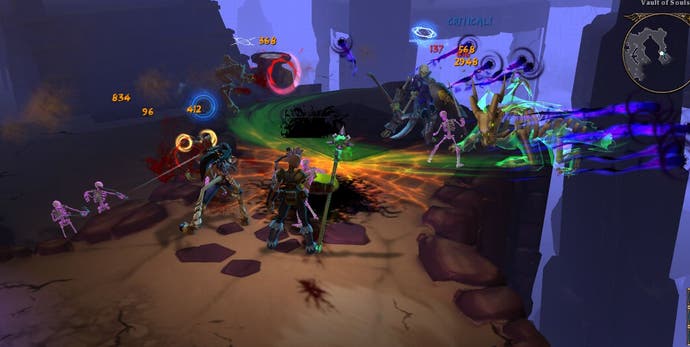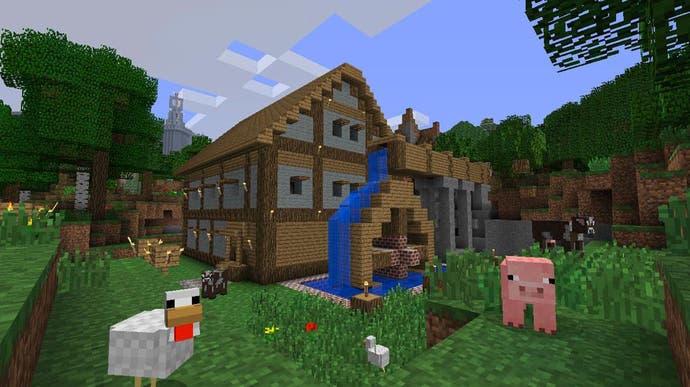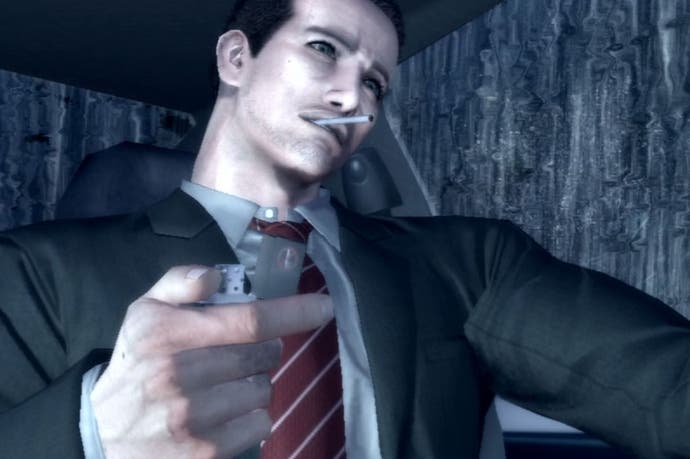You're in charge!
From vital patches to game cancellations, players are often intimately involved.
I have good news for once. You're in charge. Sometimes. Or at least you could be. Heckfire, in many ways, maybe you have been forever. You've probably known it for ages, too. So how does it feel? How does it feel to be in charge?
Alright, I appreciate that the idea of consumer power, particularly with an industry that generates this kind of loyalty, this kind of attention to detail, and that experiences this sheer rate of change, is hardly new. That said, in an era of EULAs, online verification, DRM, server shutdowns and day-one paid DLC, you should probably leap at every chance you get to remember that you have some control over the things you love.
The past week has seen at least two stories highlighting a few of the different types of influence that you wield, so it seems like a good time to restate just how important the punters are - and often in unusual ways. The first story is the news that a modder has fixed the resolution on Deadly Premonition's apparently rather ropey PC build. The second is that EA has cancelled the new Command & Conquer game due to, amongst other things, an unforeseen apathy rush.
Let's tackle the unambiguously cheery one first. Deadly Premonition: The Director's Cut is locked at 720p on PCs. Or at least it was until a modder named Durante came along and released a patch that changes all that. The patch is fairly rough and ready at the moment - these are strange days indeed where even mods have early access programmes - but Durante's got form. Sweet, sweet form, as it happens: before coming to Agent York's rescue, he saved Dark Souls from its own fairly rough PC port - and freed visitors to Lordran from a similar case of crippling fixed resolution. That's practically a glissando of heroism right there.

Besides being PC ports of Japanese games, both Dark Souls and Deadly Premonition have one crucial thing in common: people love them. Not tens of millions of people, perhaps, but the hundreds of thousands of people who love them tend to love them very, very much. And increasingly that means that, if the publishers can't do these games proud on PCs, the community will. From a grumpy perspective, this is crowd-sourced QA and product development. From a breezier vantage point, it's the power of fans - their power to help the games they love live up to their true potential, even when it means pushing back against not just technology, but market forces.
The same thing happened at the end of last year, actually, when Supreme Commander fans released Forged Alliance Forever and gave the game the online client it could otherwise only dream of. I haven't played it much, but I still got a tear in my eye when I read about the extents these coders had gone to. There's nothing quite so wonderful to witness as love, and this is surely love of the very purest order.
So fans can save games even when their publishers can't or won't. This brings us to the second story: forget SupCom for a minute, what about one of the other titans of the RTS landscape? What about Command & Conquer?
Oh, it's just been canned. And the studio that was making it has been shuttered. It's hard to argue that this is a good development - I've met some of the team making this game, and they seemed like lovely people, committed to their cause. Maybe it's just bad old EA again, eh? Bad old EA, crushing its own studios, stomping on its own flowerbeds.
Here's the thing, though: I suspect the fans cancelled the new Command & Conquer reboot long before Andrew Wilson fixed Victory Games in his terrifying yet youthful gaze. The fans cancelled the game with disinterest, many of them shunning the alpha and rejecting, perhaps, the central premise - a free-to-play Command & Conquer with little in the way of campaign content. I've seen the game in action. I doubt it was going to be bad, but it wasn't what the fans were after. That meant it wasn't what EA were after, because the fans were going to be paying for the thing. "We are not making the game you want to play," admitted Victory in a final statement. And now the game's gone.

Whether it's creation or destruction, the extent to which players are in charge can run surprisingly deep these days. And, speaking of creation, it's worth going back to that first story for a minute, since mods seem like a particularly illuminating topic. This passing era, after all, was meant to be the era of user-generated content. And it has been, to a certain degree. I've certainly built the odd Batcave or Ghostbusters HQ in LittleBigPlanet, and I even knocked together an assault course or two in that EA Create thing from a few years back. (Once again, the market spoke about that and, once again, EA listened.)
I can't help but feel, though, that many publishers got the wrong idea about how UGC would pan out; that it would involve clearing away tidy little spaces within their games where players could - and often did - build amazing things where they had been told they were allowed to. The real UGC - the stuff that's truly exciting - was already going on far beyond that with modders, though, and it had been for years. UGC's still at its most involving when players get their hands around the entirety of the actual game itself - when Durante fixes shonky ports, when Salan puts together a complete conversion of Torchlight 2 before Runic's even released its own tools, when those SupCom guys resurrect a series whose publisher had just gone under.
The lesson from this? Again: you're in charge. Publishers have their own notion of what UGC should mean, but the players are the people who ultimately define it for the long term, just as it's the players who decide when a series should be cancelled, or when a cancelled series should have one last gasp.
This kind of stuff has been around in some form since the start of games, of course, but I suspect it's only going to increase. I'm not just talking about greenlighting or kickstarting or early-accessing or making hats, either. Look at the Vita, a lovely failing platform which Sony's only just started to repurpose since it's started to see the machine that its audience actually wanted - a machine that plays Proteus rather than Resistance, a machine for the indies more than the blockbusters. The Vita's headed for a much smaller audience than was originally conceived, granted, but Sony genuinely appears to have listened to that audience all the same.
Oh, and yes, there are still plenty of things that players can't control. There are many awful, idiotic wrongs the masses can't yet right, and, on the opposite side of things, it's also worth remembering that you really don't always want artists listening to their audiences on all matters anyway.
Even so, this is a great time to wield a little influence, isn't it? How far can you go? Can you tackle the really big stuff? Hey, over the last few months, you've already helped knock Xbox One into shape as it is.
Thanks for that, by the way. And keep up the good work.



-3-31-23-screenshot.png?width=291&height=164&fit=crop&quality=80&format=jpg&auto=webp)





